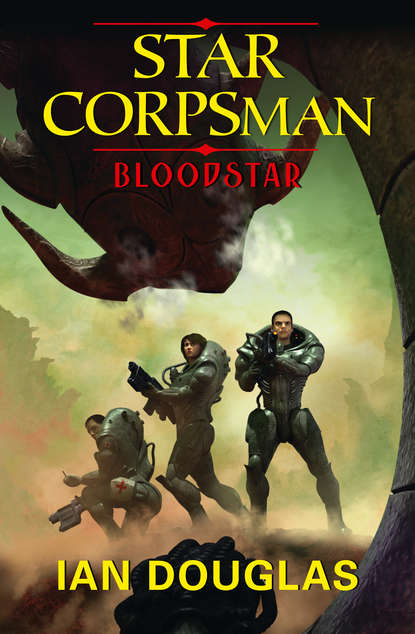По всем вопросам обращайтесь на: info@litportal.ru
(©) 2003-2025.
✖
Bloodstar
Настройки чтения
Размер шрифта
Высота строк
Поля
Vision: ~5 micrometers to 520 nanometers, Hearing: 2 to 6000 Hz
Member: Galactic Polylogue
Receipt galactic nested code: 1.61 x 10
s ago
Member: R’agch’lgh Collective
Locally initiated contact 1.58 x 10
s ago
Star F1V; Planet: Sixth
a = 2.4 x 10
m; M = 2.9 x 10
g; R = 2.1 x 10
m; p = 2.7 x 10
s
P
= 3.2 x 10
s, G = 25.81 m/s
Atm: O
26.4, N
69.2, CO
2.5, CO 2.1, SO
0.7, at 2.5 x 10
Pa
Librarian’s note: First direct human contact occurred in 2188 C.E. at Gamma Ophiuchi. Primary culture now appears to be nomadic predarian, and is extremely dangerous. Threat level = 1.
We’d all downloaded the data on the Qesh, of course, as part of our Marine training. Know your enemy and all of that. Humans had first run into them fifty-nine years ago, when the Zeng He, a Chinese exploration vessel, encountered them while investigating a star system ninety-some light years from Sol. The Zeng He’s AI managed to get off a microburst transmission an instant before the ship was reduced to its component atoms. The signal was picked up a few years later by a Commonwealth vessel in the area and taken back to Earth, where it was studied by the Encyclopedian Library at the Mare Crisium facility on the moon. The Zeng He’s microburst had contained enough data to let us find the Qesh in the ocean of information within the Encylopedia Galactica and learn a bit about them.
We knew they were part of the R’agch’lgh Collective, the Galactic Empire, as the news media insisted on calling it. We knew they were from a high-gravity world, that they were big, fast, and mean.
And with the ongoing collapse of the Collective, we knew they’d become predarians.
The net media had come up with that word, a blending of the words predators and barbarians. That was unfortunate, since in our culture barbarian implies a relatively low technology; you expect them to be wearing shaggy skins, horned helmets, and carrying whopping big swords in their primary manipulators, looking for someone to pillage.
As near as we could tell, they were predators, both genetically and by psychological inclination. Their societal code, JKRS—which is where “Jackers,” one of their popular nicknames, had come from—suggested that their dominant culture was organized along clan/family lines, that they’d evolved from carnivorous hunters, that they considered themselves to be warriors and possessed what might be called a warrior ethos, and, perhaps the most chilling, that they possessed an essentially Darwinian worldview—survival of the fittest, the strong deserve to live. The fact that their technological level allowed them to accelerate asteroid-sized rocks to near-c and slam them into a planet was a complementary extra.
These guys had planet-killers.
The Crisium librarians thought—guessed would be the more accurate term—that the Qesh constituted some sort of military elite within the R’agch’lgh Collective, a kind of palace guard or special assault unit used to take out worlds or entire species that the Collective found to be obstreperous or inconvenient. But with the fall of the Collective, the Qesh were thought to have gone freelance, wandering the Galaxy in large war fleets taking what they wanted and generally trying to prove that they were the best, the strongest, the fittest—something like a really sadistic playground bully without adult supervision.
That change of status must have been fairly recent—within the last couple of thousand years or so. According to the EG, they were still working for the Collective.
And for all we knew maybe some of them were, way off, deep in toward the Galactic Core, where the R’agch’lgh might still be calling the shots. Our local branch of the EG Library hadn’t been updated for five thousand years, however, and evidently a lot had happened in the meantime.
The Galaxy was going through a period of cataclysmic change, but from our limited perspective, it was all taking place in super-slow motion.
“What,” I said. “The Qesh are coming here?”
“My friend in Personnel,” Lewis said, “told me there’d been a call for help from one of our colonies. The colony is supposed to be pre-Protocol, so …” She shrugged. “Send in the Marines.”
It made sense, in a horrific kind of way. Commonwealth Contact Protocol had been developed in 2194, and it laid out very strict rules and regs governing contact with new species. Partially, that was to protect the new species, of course. Human history has a long and bloody tradition of one culture stumbling into a new and eradicating it, through disease, through greed, through conquest, through sheer, bloody-minded stupidity.
But even more it was to protect us. We were just at the very beginning of our explorations into the Galaxy, and there were Things out there we didn’t understand and which didn’t understand us—or they didn’t care, or they simply saw us as a convenient source of raw materials. Over the course of the past fifty years, we’d taken special steps to screen our civilization’s background noise, and the AI navigators in our starships were designed to purge all data that might give a clue to the existence and location of Earth or Earth’s colonies if they encountered an alien ship or world.
A Qesh relativistic impactor, it was believed, could turn Earth’s entire crust molten. We did not want to have them or their Imperial buddies showing up on our doorstep in a bad mood.
The problem was, the barn door had been open for a bunch of years, and the horses had long since gotten loose. Radio and television signals were expanding into interstellar space at the rate of one light year per year, in a bubble now something like six hundred light years across. Technology researchers liked to insist that the useful information/noise ratio drops off to damned near zero only a couple of light years out; anyone out there listening for a juicy young prespaceflight civilization probably wouldn’t be able to pick our twentieth-century transmissions out of the interstellar white noise—but the kicker was the word probably. We just don’t know what’s possible; the EG mentions galactic civilizations out there that are on the order of 5 × 10
seconds old—that’s longer than Earth has been around as a planet. I don’t think it’s possible for us to say what such a civilization could or could not do.
But things get uglier when it comes to our pre-Protocol colonies. There are a lot of them out there, scattered across the sky from Sagittarius to Orion. The earliest was Chiron, of course, at Alpha Centauri A IV, founded in 2109. They’re all close enough to Earth to have signed the Protocol shortly after it was written, but there are plenty of colonies out there that for one reason or another have nothing to do with Earth or the Commonwealth. Many of them we don’t even have listed, and if we don’t know they exist, we can’t police them.
But if they were established before the year 2194, they probably still have navigational coordinates for Earth somewhere in their computer network. And someone with the technology to figure out how our computers work, sooner or later, would break the code and they might come hunting for us.
Our only recourse in that case was to go looking for them. If we could contact them and get them to agree to abide by the Protocol, great.
But if they didn’t … well, as Lewis had so eloquently put it, Send in the Marines.
“Now hear this, now hear this,” a voice said from the squad bay’s intercom speaker. “All hands prepare for one gravity acceleration in ten minutes, repeat, ten minutes. Secure all loose gear and reconfigure hab module spaces. That is all.”
“That was fast,” Dubois said.
“Yeah, but where the hell are we going?” I wanted to know. I looked at Lewis. “Your friend have any word on that?”
“Actually,” she said, “from what he said, hell is a pretty good description.”
In fact, though, our destination turned out to be Earth.
Most of the hab space on board an attack transport like the Clymer is dedicated to living space. She carries 1,300 Marines besides her normal complement of 210 officers and crew, and all of that humanity is packed into the rotating ring around her central spine, along with the galleys and mess halls, sick bay, lab spaces, rec and VR bays, life-support nanufactories, and gear lockers.











